
All our policy briefs are free to use but can not be reproduced for sale or placed behind a paywall or subscription based portal. The work is licensed under a Creative Commons Attribution-NonCommercial-ShareAlike 4.0 International License.
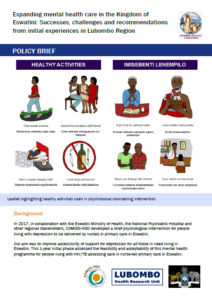
Expanding mental health care in the Kingdom of Eswatini: Successes, challenges and recommendations from initial experiences in Lubombo Region
This policy brief presents initial findings from a psychological intervention for people with HIV/TB living with depression accessing nurse-led primary care in Eswatini.
PDF Version | HTML Version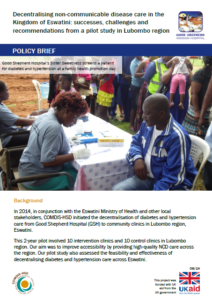
Decentralising non-communicable disease care in the Kingdom of Eswatini: successes, challenges and recommendations from a pilot study in Lubombo region
In 2014, in conjunction with the Eswatini Ministry of Health and other local stakeholders, COMDIS-HSD initiated the decentralisation of diabetes and hypertension care from Good Shepherd Hospital (GSH) to community clinics in Lubombo region, Eswatini. This 2-year pilot involved 10 intervention clinics and 10 control clinics in Lubombo region. Our aim was to improve accessibility by providing high-quality NCD care across the region. Our pilot study also assessed the feasibility and effectiveness of decentralising diabetes and hypertension care across Eswatini.
PDF Version | HTML Version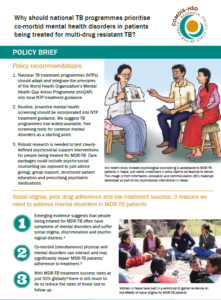
Why should national TB programmes prioritise co-morbid mental health disorders in MDR-TB patients?
Evidence suggests MDR-TB patients often have symptoms of mental disorders and suffer social stigma, discrimination and psychological distress. This policy brief recommends that the principles of the World Health Organization’s Mental Health Gap Action Programme should be integrated into national TB treatment programmes. Routine, proactive mental health screening should be incorporated into guidance and robust research is needed to test clearly-defined psychosocial support interventions.
PDF Version | HTML Version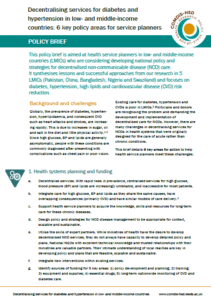
Decentralising services for diabetes and hypertension in low- and middle-income countries: 6 key policy areas for service planners
This policy brief is aimed at health service planners in low- and middle-income countries (LMICs) who are considering developing national policy and strategies for decentralised non-communicable disease (NCD) care. It synthesises lessons and successful approaches from our research and focuses on diabetes, hypertension, high lipids and cardiovascular disease risk reduction.
PDF Version | HTML Version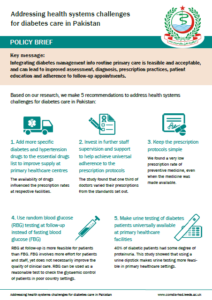
Addressing health systems challenges for diabetes care in Pakistan
Integrating diabetes management into routine primary care can lead to improved assessment, diagnosis, prescription practices, patient education and adherence to follow-up appointments. This policy brief offers 5 key recommendations from our research.
PDF Version | HTML Version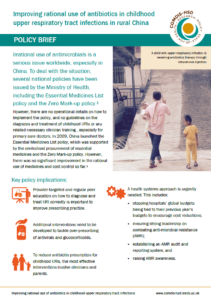
Improving rational use of antibiotics in childhood upper respiratory tract infections in rural China
Irrational use of antimicrobials is a serious issue worldwide, especially in China. Additional interventions need to be developed and a health systems approach is urgently needed. Read our policy brief for more on our recommendations to tackle over-prescribing of antivirals for childhood upper respiratory tract infections (URIs).
PDF Version | HTML Version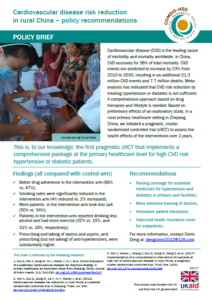
Cardiovascular disease risk reduction in rural China – policy recommendations
In China, CVD accounts for 38% of total mortality and is predicted to increase significantly. This policy brief shares our findings and recommendations from a pragmatic, cluster randomised controlled trial in Zhejiang province, China. Our study shows that a comprehensive care package at primary healthcare level can lead to better drug adherence, significant reduction in smoking and reduced alcohol and salt intake.
PDF Version | HTML Version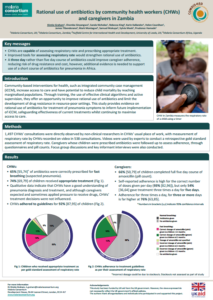
Rational use of antibiotics by community health workers (CHWs) and caregivers in Zambia
This policy brief shows that community health workers (CHWs) in Zambia are capable of correctly assessing and treating pneumonia symptoms in children. However, to further strengthen the rational use of antibiotics, we recommend improved respiratory rate assessment tools for CHWs.
PDF Version | HTML Version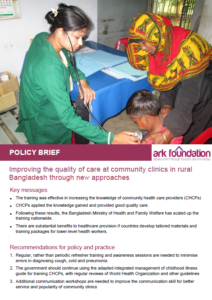
Improving the quality of care at community clinics in rural Bangladesh through new approaches
Our research shows that there can be substantial benefits to healthcare provision if countries develop tailored materials and training packages for lower-level health workers. Regular refresher training for community health care providers, specially-adapted job aids and help to improve communication skills are among the key recommendations from our study.
PDF Version | HTML Version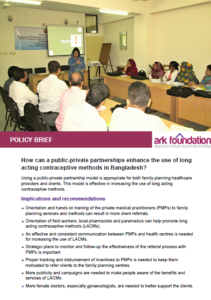
How can public-private partnerships enhance the use of long acting contraceptive methods in Bangladesh?
Our findings show the public-private partnership model is acceptable and appropriate and increases the use of long acting contraceptive methods. Our recommendations include the need for hands-on training of private medical practitioners (PMPs) to improve their knowledge of family planning services and methods. Proper tracking and disbursement of incentives to PMPs is needed to help keep them motivated and actively referring to family planning centres.
PDF Version | HTML Version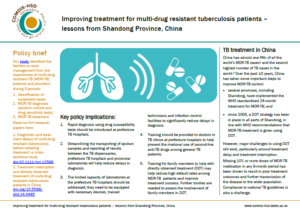
Improving treatment for multi-drug resistant tuberculosis patients – lessons from Shandong Province, China
A summary of the key policy messages from our research into why MDR-TB patients are experiencing delays and interruptions in their TB treatment and the service improvements that will help address these barriers.
PDF Version | HTML Version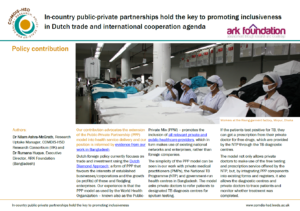
In-country public-private partnerships hold the key to promoting inclusiveness in Dutch trade and international cooperation agenda
This policy contribution was developed in response to a Dutch Ministry of Foreign Affairs online consultation. It advocates the extension of the public-private partnership (PPP) model into health service delivery and draws on our work with private and public healthcare providers in Bangladesh.
PDF Version | HTML Version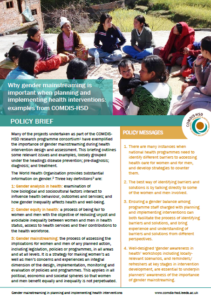
Why gender mainstreaming is important when planning and implementing health interventions: examples from COMDIS-HSD
Many of the projects undertaken by COMDIS-HSD have shown the importance of gender mainstreaming during the design and assessment of health interventions. This policy brief outlines some examples and shares our experiences of gender mainstreaming in disease prevention, pre-diagnosis, diagnosis and treatment. It shows that the best way of identifying barriers and solutions to accessing healthcare is to talk directly to some of the women and men involved.
PDF Version | HTML Version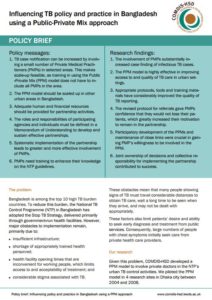
Influencing TB policy and practice in Bangladesh using a Public-Private Mix approach
Bangladesh is among the top 10 high TB burden countries. This policy brief describes how the involvement of private medical practitioners (PMPs) can substantially increase case finding of infectious TB cases. We found that the 'public-private mix' (PPM) model is highly effective in improving access to and quality of TB care in urban settings and that appropriate protocols, tools and training materials have considerably improved the quality of TB reporting.
PDF Version | HTML Version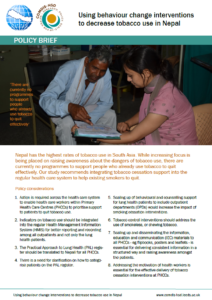
Using behaviour change interventions to decrease tobacco use in Nepal
Nepal has the highest rates of tobacco use in South Asia. While increasing focus is being placed on raising awareness about the dangers of tobacco use, there are currently no programmes to support people who already use tobacco to quit effectively. Our study recommends integrating tobacco cessation support into the regular health care system to help existing smokers to quit.
PDF Version | HTML Version

